Registered Nonprofit
Association for the Support
of Children and Needy
People Around the World
Unterstützung
Soup kitchen, distribution of blankets and caps, well drilling
Tue, 01.12.2015 - 8.30pm, report from Alexandra and Jürgen, uploaded by Frank
Tamil Nadu, flood
During the landing approach over Chennai, the capital of the state of Tamil Nadu, we can see the dimensions of the 10-day flood disaster. For 20 years, the late monsoon has not so badly hit the town. The area around Chennai is like a murky lake scenery with a few small islands. The road from the airport leads partially through flooded roads and there is still heavy rainfall. In some places the water level is so high that the water level in open restaurants is 20 cm high. All in all, the taxi driver who himself lives in a leprosy village, tells us that the water has already fallen sharply since the government in many places has been pumping the water with motorized pumps systems out of the city. For this, here and there deep trenches have beene opened up in the streets to make the water flow out. At more southerly locations, 100 people have been ripped off by dam bursts, the newspapers report.
First we visit a leprosy village to get an impression of the actual situation. The damage caused by the floods is limited; therefore, we decide to explore the wider surroundings as soon as possible. We want to look for families, who have been particularly hard hit by the storms. On our way we notice fenced residential ghettos, simple huts in a confined space with the usual corrugated iron roofs. As it turns out, these are accommodations of workers from Calcutta, who are working for construction companies here in Chennai. They live here with their families. Many are young people, between 13 to 16 years old. Many seem to be not even 12 years old.
We spontaneously stop and want to know more about their situation and their living and working conditions. They are looking at us shyly and cautiously. It takes a few minutes and a few words of translation to win their confidence. A normal weekday means 12 hours work for an average worker. On Sundays there are „only“ 6 hours works. The daily wage for their hard work on the partially insufficiently secured buildings is about 1 to 3 euros. We ask what it would need to give them a treat. Their request is: fresh fruits, a delicacy which these families can ill afford. We say goodbye and promise to come back the next day.
As we reach another worker settlement, the manager of the construction company refuses the entry. While Alexandra is discussing with the man, a jeep approaches from behind and stops. A friendly young man asks for the reason of the debate and Alexandra outlines our intention. The men in the car are apparently impressed and invite us to follow them by taxi. However, one thing is already clear: we will come back to these workers, though the access has been barred!! A few minutes later it turns out that the new friends are also managing a construction company in the neighborhood and are already supporting a number of needy families. They gladly show us an array of huts, partly made of straw and wood, with some rooms made of concrete, most of which have been flooded or are at least still wet.
As in similar situations that we have experienced so far, we can see that the very poor families stick together. They are sharing the few things they have. Some families have temporarily found shelter in equally small houses of their neighbors. But among those who have lost everything, there are others who have been hit worse: widows with children without male assistance, old people with serious diseases, etc.
We try to find out these special cases and to assist them with an additional financial gift. The joy is great. There are women among the many whose belongings have been soaked by the water. They even have no certainty that their hut will ever be habitable again once the water will have dried off. They can only hope and pray to use their best efforts to survive from one day to the next. We visit many huts, trudge carefully through waist-deep water, always aware that there might be somewhere a deeper mud hole. We are warned against water snakes and someone adds "No problem, they are not poisonous!" A bit of burned ash is in front of a door. "What's that?" we ask. "Against the reptiles, yesterday we had a cobra here." How comforting!
After a few hours of visits, we decide to bring the next day bags with bread, milk and oranges for 400 families. The workers settlements should as well receive the promised fruit. No sooner said than done! By joining forces, or rather, the concerted efforts of our newly acquired friends and the existing teams we decide in no time, who will be organizing what. Without hesitating, our friends tell us "We will provide the trucks free of charge.”
We are very pleased about this generous support. Our young taxi driver adds that he will organize the purchase of fruits at 3am, which is the usual time for errands in wholesale markets. We need 5000 oranges!
We say goodbye to organize on our way back the purchase of rice and lentils for the elderly people in the leprosy village. At a booth in the city a man approaches us spontaneously and asks about the reason for our stay. Alexandra tells him about our projects. It quickly turns out that the man is heading a group of young "scouts" similar to scouts in Germany. Within a few minutes, he organizes some youngsters who will help the next day with the distribution. We are surprised, but also happy and relieved about the overwhelming support from all sides.
After a quick breakfast we drive the next morning motivated to the wholesale to start our long day with various projects with the orange truck convoy. Our car drives up close to a small garbage dump, behind which the water has accumulated in a deep trench forming a thick broth. Beautiful, deep dark brown water buffalo are just taking their morning bath in the opaque water. If you think that in India you can adhere to a certain plan and follow an exact schedule, you will be quickly disabused. Now there is first a 40-minute show of buffalo bathing on the program. Experienced India travelers normally relax very quickly and then easily tackle the next program item, but also for Petra and Carmen the buffalo show was a special experience.
As the person in charge at last comes back from the fruit market with the truck full of oranges, the atmosphere is cheerful and we can go ahead. When we arrive at the village we have to concentrate. Our friends show us, in which huts we will visit the people. Only the neediest are to be considered. Often they refuse to accept saying: "No, others need it more urgently, unfortunately!"
Wherever possible, the vehicles with the aid packages follow us through the flooded streets. For security reasons, the bags are sometimes handed down up to the houses by human chain. Many, many people are profiting on that day and there are emotionally moving moments.
Also our new friends from the construction company and the scouts are very happy about the successful, joint activity. We are invited for lunch. Although we have met only yesterday there is already a strong connection by the common experience. "We learned a lot today," says the friendly head of the scout group. "Please, promise that you will not forget us," one of our friends says. "No, how could we!"
It hurts when we leave, and here and there a few tears flow. It is late afternoon and it will soon get dark. Venu urges: "We have to leave!"
We still have a lot of bags with oranges. The second part of our action leads us to the workers’ ghetto, as we had promised the day before. The joy about the fresh fruit is huge. Quickly 4 oranges are handed over to each worker. Here and there, there is a little crowd around the precious delicacy, but in the end are all friendly to each other and probably this was simply the bustling excitement.
Finally, there is still a special mission to fulfil: get to the workers where we were not allowed to go to. We ignore the ban. Perhaps we will not be seen in the dark...
While Alexandra leads the way with firm determination Jürgen, Carmen and Petra follow her trudging through the soft soil, "armed" with bags full of juicy oranges, directly into the camp. On the way to the entrance Jürgen wades through deep mud and loses his shoe. His second shoe also gets stuck in the swampy morass. But the bags must be brought into the settlement. With the oranges in the white plastic covers we have hardly reached the entrance of the ghetto as families, especially young children gather around us. Among them also the manager of the construction site. Before he can intervene, Alexandra tells about our peaceful intent and soothes him while Jürgen, Carmen and Petra are already busy distributing. It turns out that the manager initially thought that we were from the press and were up to no good. At the end he is visibly impressed by the action and wishes us the best. All say goodbye warmly, even the manager of the construction site, who is now shaking hands with all of us and smiling friendly. It is already dark when we reach the leper colony, which we had visited first. Representatives of each family of the colony have gathered in the common room. After children and women of the village had presented some dances and songs, the head of the village holds a little speech and expresses the joy of all those present over the rice and lentils for the elderly. Finally, we give away Pani Poori, a sharp treat for the children. This is also a special pleasure to the seller, because his stand is empty today after we have bought everything ;-). As always, the farewell is very warm. It's already after 10pm when we arrive at the hotel and have a snack for dinner. We are satisfied that everything went smoothly. It gives us a wonderful feeling that our efforts had borne fruit. A last common flight from Chennai to Mumbai is ahead, then our paths will diverge.
While Petra, Carmen and Jürgen return by flight via Istanbul to Germany, Alexandra will travel further north to make many more children and families happy with the beautiful caps from our knitting ladies in Germany, Luxembourg and Switzerland, and other warm things.
THANKS to ALL at home who make this work possible!!! May the joy and the love that we have experienced here also make you happy ...
Mon, 30.11.2015 - 6:30pm, report from Alexandra and Jürgen, uploaded by Frank
Well drilling in the leprosy colony near Hyderabad
So far it appears that throughout the entire journey unavoidably the nights are short or rather that we have to continue all night through without any sleep. Starting with the first flight from Nuremberg to Delhi followed by the night of blanket distribution, the flight from Delhi to Hyderabad at 3am – and more such nights are waiting for us, though unplanned...
As we arrive at the airport in Hyderabad (by train this journey to the south would have taken about 2 days which would not have been feasible in view of our actual tight schedule), it is already 5.30am. We continue to the hotel by taxi which takes another 2.5 hours. Then a quick check-in, freshen-up and then we drivie half an hour to the village in the state of Telengana near the city of Hyderabad, the fourth largest city in India.
Last August, Katrin and Thomas had visited the leprosy village „Vavilala Jammikunta“ for the second time already and found that the well water for drinking had a brown color and was completely unsuitable as drinking water. At that time, our well-known, reliable hydro-geologist had stated that it is almost impossible to find a suitable location for drilling during the rainy season. At least the probability of a failure was very high.
When we arrive at the village the residents are very happy. Also the hydro-geologist has already been waiting for us for several hours and greets us warmly. We once had shared with him the pleasure of a successful drilling in another village. Unfortunately, also this time this expert is not very confident for a successful drilling for heavy rain has been predicted which could distort his measurements.
While he immediately starts work, together with his team, the villagers show us some fields which they despite their disabilities on hands and feet, are laboriously cultivating. When the river 2 km away brings enough water during the cooler season, it can be used for the farming of the fields. If not, the harvest will be quite poor.
With his hands without fingers one of the men shows us how he is digging small holes on the edge of his field so that the water is running during a few minutes into lovingly shaped furrows thereby irrigating the small corn plants. When enough water has flown into the furrow, he pushes back the earth into the hole in order to block the access to the first furrow and then open it to the second one.
After three measurements at different places, the geologist selects a certain place assuring us that there is an 80% probability to find water there at a depth of 300 feet equaling about 100 meters. The tension increases...
Then we get a phone call saying that the drilling contractor which we had booked already some days in advance is already booked elsewhere for this afternoon. However, the company owner tells us that they could start work the same night at 1am.
In order not to disturb the project schedule, we of course agree.
One after another the people show us their small rooms made of concrete and tell us about the numerous difficulties they are facing due to their disease. Venu and Meena are translating. We gladly lend them our ears and often tears are flowing. Maybe also because there is someone they can pour out their heart to...
While Jürgen uses the time to record everything on the computer, a man shows his deep gratitude by sitting close to him and watching quietly for hours. According to Indian hospitality, the villagers bring their own camp beds from their small rooms to the central village square and offer them to the guests. All together we eat what we have brought along from the hotel and then all are patiently waiting for the arrival of the drill rig. The warm temperatures in this southern state are pleasant and even the amount of mosquitoes is this evening quite manageable. Only the so much needed sleep is again scant. However, one of our dear Indian friends is gently sleeping in the center of the square and snoring so much that every breath makes us jolt. Sometimes he is quiet and some of us start nodding a bit, but after a short time we all have to realize: only one of us is sleeping!
At 2am – quite in time for Indian standards – the drilling team arrives. A truck with the drilling device and another one fully loaded with material and drill rods. Some 10 young workers are on the trucks, behind them or in front of them. With a several meters high and probably specially crafted wooden fork one of the men lifts the electrical lines so that the vehicle can pass. No easy task, especially since the place foreseen for the drilling can only be reached by crossing dense bushes and thick undergrowth.
Finally, the car and the tools are on the right place. The well-versed young men start the complex work, after the residents of the colony had traditionally prayed for divine assistance. Hours of tension follow with conversations, silence, talking, chai to keep up...
And at 6am finally: water!!
The drilling is successful and there is plenty of clear water! We are very happy that the efforts are rewarded by this positive result. Feelings of relief, gratitude, and more cannot express what is going on in each one of us and in the residents of the colony.
After a warm farewell we drive to the office of the drilling company to effect the payment. As usual, Venu explains the philosophy of FriendCircle WorldHelp, explaining that no one is deriving any profit and that the friends for this good cause are spending their own money to pay for the flights, etc. The company owner is visibly moved and says that he also wants to make a contribution. A generous rebate results. The 18 year old son of the owner who had spent the whole night with us in the colony had tears in his eyes as we said good-bye. We are as well very touched.
This is one of these moments on our journeys when we feel very intensely that the spirit of “selfless service to people“ is spreading with joint activities. The resulting connection is quite special and makes us feel like ONE family.
When we reach the hotel around noon, the program for today is „sleeping“, so as to survive also the forthcoming days unscathed. (Experience has shown that lack of sleep may be a good breeding ground for diseases.)
The next morning we will fly further south. The news in newspapers and television report about devastating floods in the state of Tamil Nadu with water masses as had not been experienced since 20 years. The train route is partly destroyed by the flood leaving us no choice but to fly again. For us personally this means a financial disadvantage, but the positive aspect prevails, i.e. there will be more time for work...
Many thanks to ALL our friends supporting us at home. Your thoughts and your great support are irreplaceable!
Sun, 29.11.2015 - 7:50am, report from Alexandra, uploaded by Frank
Good morning, here is the report of the first days in India. You will also find first photos online, more will follow tonight.
Distribution of blankets during the night and help for street children
On Tuesday, Nov.17.2015, the four-member team of FriendCircle WorldHelp set out from Nuremberg to Delhi. On the tight 10-days-plan, four work assignments are fixed in three different Indian states. This time, the team members are Jürgen Lütke Wenning and Petra Becker from Tauberbischofsheim, Carmen Benz from Haslach in Kitzigtal, Alexandra and of course again many of our Indian friends and supporters.
After the four friends arrived at the hotel in Delhi the next day at 6.30 a.m. they took a hot shower and immediately turned to the organizational things. Among others they need Indian sim cards for the sometimes urgently needed contact to Germany e.g. to the back office with Frank or at home to change the booking of a flight.
In a textile shop Carmen and Petra buy material for their Indian clothes. Right after that, the materials for the tops are brought to the tailor as a rush order and he takes measure immediately. In addition to preparing the planned distribution of blankets in the night to freezing people we decide spontaneously to visit some families who live on the street whom we had just seen on the ride from the airport to the hotel. The children and adults on the road get fruits and hand-knitted hats knitted by our friends in Germany. The joy is huge again.
Soon even in Delhi the sun will be no longer shining during the day as nice as it is now. Often high mist lasting for days will spread all over the north for several weeks. Especially at night, warm clothes and blankets are of enormous importance. At zero or even minus 2 degrees at night, on the bare ground or cold asphalt, many people get ill. Especially children and old people quickly get a cold, fever, lung diseases, etc.
Often they do not have hot meals which could warm the body from inside. Life on the street is hard. Fruits are something very rare for most of the people which they cannot afford. One kilo of oranges costs 57 cent, while the average daily income of a bicycle riksha driver is only about 1,50 Euro and with this income he must feed the whole family.
One of the children on the street, in which we distribute caps, an approximately 6-year-old girl named Ritu had suffered a fresh laceration on her right cheek. Immediately we bring the child and her father to a nearby hospital. There, the girl is directly served in the emergency room by exceptionally friendly doctors and the wound gets stitched with a few stitches. After we had bought the medicine prescribed for the following days, including syrup (probably with antibiotics) for oral use, the father and the little one return "home" back on the road. On the street, wounds can easily develop into a sepsis.
In the afternoon we drive to a blanket dealer in another district of Delhi, whose name we were told by a friendly gentleman in the currency exchange. The quality of the blankets is fine and we get them at a price of 210 rupees per piece, which are at the present exchange rate exactly three euros. We also order from another trader who will also deliver them 850 more blankets for distribution in the night. Then we continue under the bridges of Delhi, where we encounter many other street children, who get bananas as well as one of our wonderful, colorful caps.
In the early evening four other Indian friends arrive at the hotel in order to strengthen our team. Not too long ago, some of them lived themselves on the road and now want to help, to assist others who are also in need. A mini truck with the 850 blankets and the bags full of caps from our knitting ladies in Germany and a second seven-places-taxi are available for the distribution. After a short briefing all go back to sleep for a short hour or so. This time we'll have to sleep a little faster ;-) After a chai to wake up the 11- member crew starts at midnight into the darkness enlightened by streetlights.
Straightway we drive to places that are known to our Indian friends and where, already in the first street, many people rest on the bare earth. Many are lying right next to the road, covered with a thin cloth and often only with a plastic tarp. Some made a kind of backing of plastic sheeting or cardboard while others are sleeping on the bare stone floor. The sight is not easy for the team, but what is equally distressing is the incredible amount of people we meet.
In addition to women, children and whole families huddled under a tarp - we meet many men. During the day they perform simple tasks in the city that are paid one euro or € 1.50. They cannot afford a rent because the lean salary must be enough for the family at home, who in the vast majority of cases is living in other states. Every few months, the men drive back home to the country and deliver their earnings as sort of "guarantee of survival".
Staying at home would be no alternative, as there is often no or too little work. Most are stuck in a cycle of poverty from which there is no escape. Beyond government and social support they live from one day to another. During the distribution, we awaken the sleepers with a few words in Hindi. "blanket", "cap", we say. Drowsy and surprised, people accept the warming gifts. Painfully and slowly, some sit up and look at us with wide eyes. Some of them are thanking us, some are moved to tears, while others cannot give visible expression of their astonishment.
With the distribution in the night a rollercoaster of emotions is starting for us. Busy with work our emotions during the journey change from joyful enthusiasm to strong dismay and being deeply touched. In the morning hours, around 5:30 am. unfortunately all 850 blankets and more than 1,000 caps have been distributed. However, the number of those in need, who urgently would have needed a blanket and a hat, is still far much higher. With many thoughts and feelings that will occupy us for a long time, we go back to the hotel. At 6am we say goodbye to one another. Certainly all newly won experiences that will never end, will be considered at the next occasion, so that we will be able to reach even more people who are in need.
Thousand thanks to ALL friends at home who enabled this precious action with their participation!!
Sun, 22.11.2015 - 10:30 am, telephone report from Alexandra, uploaded by Frank
Proceeding to a place near Hyderabad - successful well drilling
Meanwhile, the team traveled from Delhi to a place near Hyderabad where they visited a leprosy colony.The people there had asked us to drill a well since the existing one supplies only "brown" water and people have to drink it ...
This morning, Alexandra reported by phone that the drilling at night was successful! This is very good news and makes us happy.
The team worked the whole night through and arrived back at the hotel in the morning. Therefore, they now have to get some sleep before the journey to the next station starts. Many greetings from Jürgen, Petra, Carmen and Alexandra to all of you!
Photos and reports will follow.
Fri 20.11.2015 - 04:00pm, telephone report from Alexandra, uploaded by Frank
Well arrived in Delhi - soup kitchen and distribution of blankets and caps
On Tuesday, Jürgen, Carmen, Petra and Alexandra flew from Nuremberg via Istanbul to Delhi. Thanks to Turkish Airlines for accepting the excess baggage. This way, a total of 11 pieces of luggage including numberless caps could travel with us to India. The flight was smooth and in the early morning of Wednesday the team arrived in the hotel. After a short rest we started the same day doing some errands. Meanwhile, the soup kitchen was already carried out – see the first photo – and blankets and caps were distributed. A detailed report with photos will follow; at the moment there is unfortunately no internet access in the hotel.
At home, preparations are underway for the dispatch of the new Newsletter and the calendars. Next week it will start.
Another project is starting in parallel, i.e. the collection of donations in kind for the transport to Romania and the support of refugees. You will soon find more information on this under the heading „Activities".
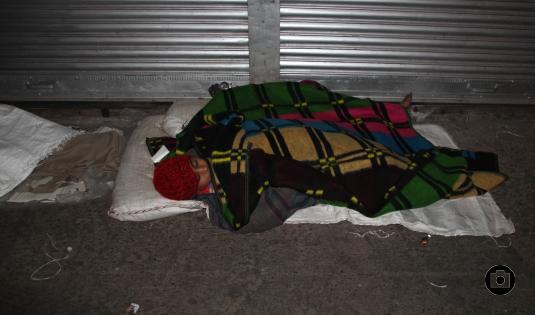

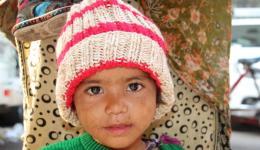
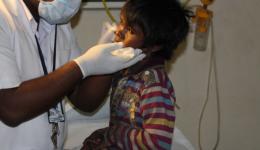
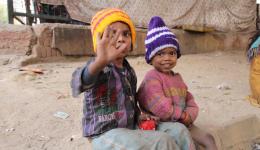
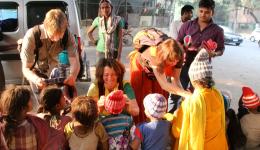
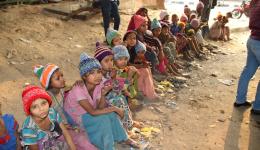
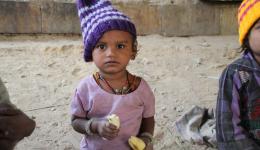
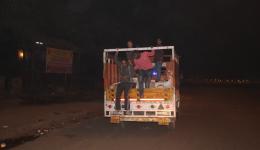
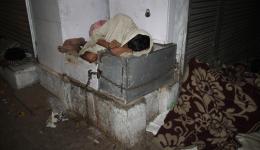
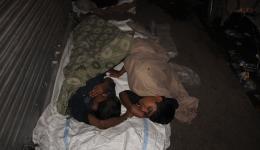
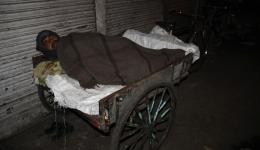
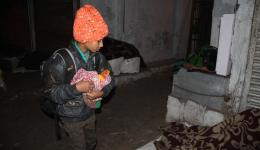
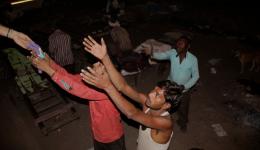
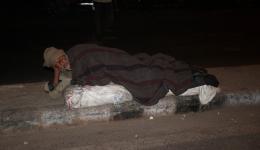
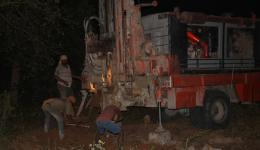
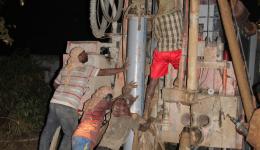
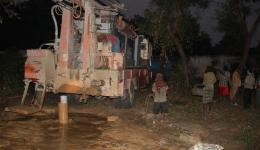
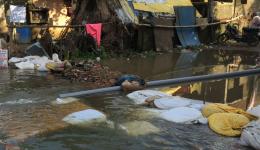
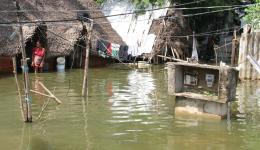
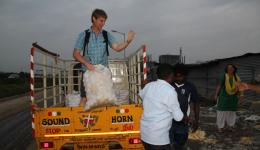
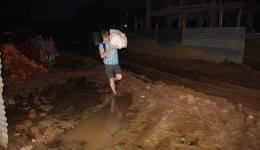
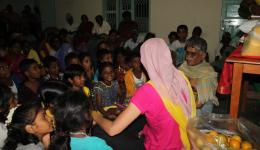
Comments(0)
Add new comment